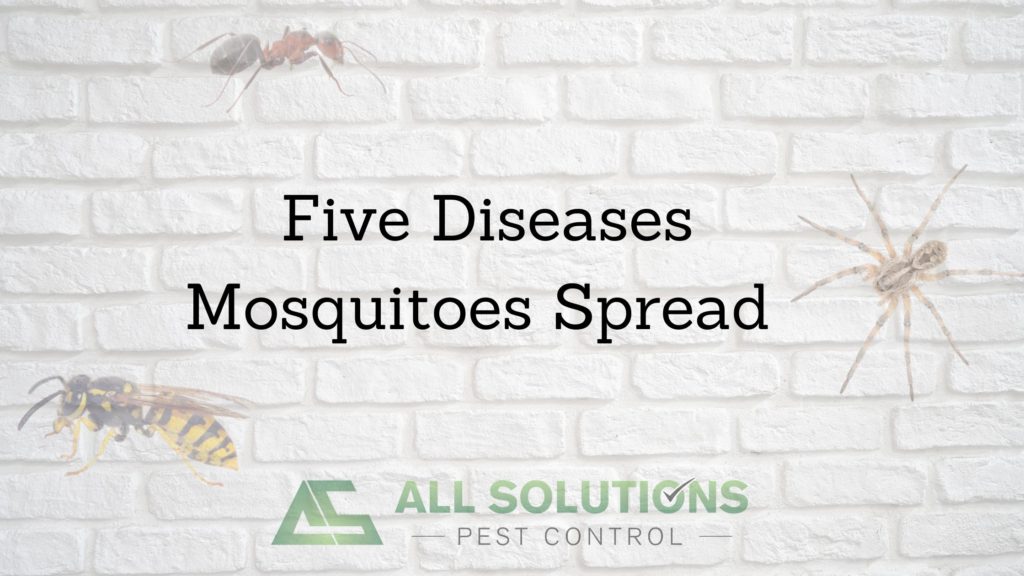Mosquitoes often act as the carriers of several harmful diseases. They can cause diseases such as encephalitis, dengue, yellow fever, and malaria in humans, while it can lead to heartworm in dogs. A majority of diseases spread by mosquitoes, with the exception of canine heartworm and encephalitis, have been eliminated from the US fairly well. However, Missouri has seen periodic outbreaks of mosquito-borne encephalitis, and canine heartworm has turned into endemic, costing animal owners hundreds of diseases. Effective mosquito control measures are essential to decrease the spread of diseases caused by mosquitoes.
Here are five diseases that are spread by mosquitoes in St. Peters:
- St. Louis Encephalitis (SLE) – It is a viral disease caused by the bite of an infected mosquito of the Culex species. The virus that causes this disease, the St. Louis encephalitis virus (SLEV), is maintained in a mosquito-bird-mosquito cycle. A majority of the people who are infected by the SLEV don’t have any apparent illness. The initial symptoms of this disease are tiredness, nausea, headache, and fever. In older adults, the severe neuroinvasive disease is more common. Death or long-term disability can also occur in some rare cases. However, there are no medications or vaccines that can prevent or treat St. Louis encephalitis. The care is based on the symptoms shown by the person.
- West Nile virus (WNV) – It is one of the most commonly reported diseases spread by mosquitoes in Missouri. When mosquitoes feed on infected birds, they get infected as well, and when such infected mosquitoes bite humans and other people, the disease gets transmitted. Cases of West Nile Virus mostly occur during the summer season and continue till the fall. There is no proper medication or vaccine to treat or prevent the spread of WNV. It is fortunate that a majority of people infected with WNV don’t feel sick. It is quite uncommon for someone infected to develop symptoms like fever. In addition to that, about 1 in 150 people infected can develop serious or fatal illnesses.
- Eastern Equine Encephalitis (EEE) – EEE is a rare disease spread by mosquitoes. The virus that is responsible for causing (EEEV) is maintained in a cycle between an avian host and Culiseta melanura mosquitoes in freshwater hardwood swamps. However, the disease is spread to humans by the Culex, Coquillettidia, and Aedes species of mosquitoes. EEE is a rare disease that affects horses and humans, and only a few cases are reported in St. Peters every year. Some people (mainly children) infected with EEEV develop severe illness, but most people don’t show any symptoms.
- Western Equine Encephalitis (WEE) – It is a viral disease that affects horses and people and is transmitted by the bite of an infected mosquito. Closely related to the Venezuelan Equine Encephalitis and the Eastern Equine Encephalitis viruses, the Western Equine Encephalitis is an alphavirus. It is primarily spread by the vector mosquito Culex tarsalis. A majority of infected people show mild flu-like symptoms or no symptoms at all. Symptoms generally appear within a span of one to two weeks of getting bit by an infected mosquito. Encephalitis or inflammation of the brain can be seen in a small percentage of people, especially older people and infants.
- Dengue – The bite of an infected Aedes mosquito leads to the transmission and spread of dengue. Although the disease is a tropical one and is not so common in St. Peters, travelers from other countries might be at risk of getting infected and spreading the disease. Some of the most common symptoms of dengue include headache, aches, pains, rashes, nausea, vomiting, and fever. The symptoms usually last for around two to seven days, and people recover after a week.
The most effective method of preventing the spread of mosquito-borne diseases is by keeping their population in check. Make sure to remove or empty any stagnant water from gutters, flowerpots, pet dishes, buckets, utensils, wading pools, etc. To get specialized mosquito management treatment that is effective against all kinds of mosquito infestations, contact All Solutions Pest Control at 636-486-7888 or mail us at [email protected]
